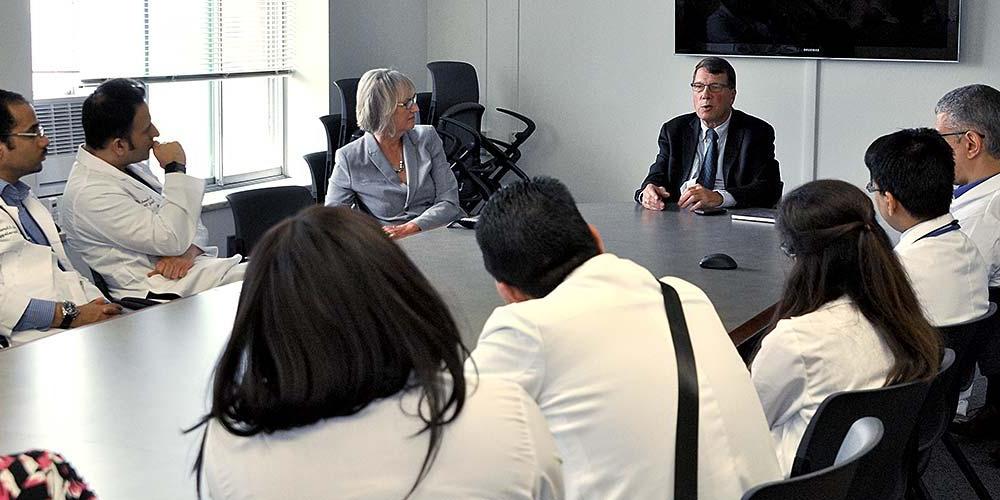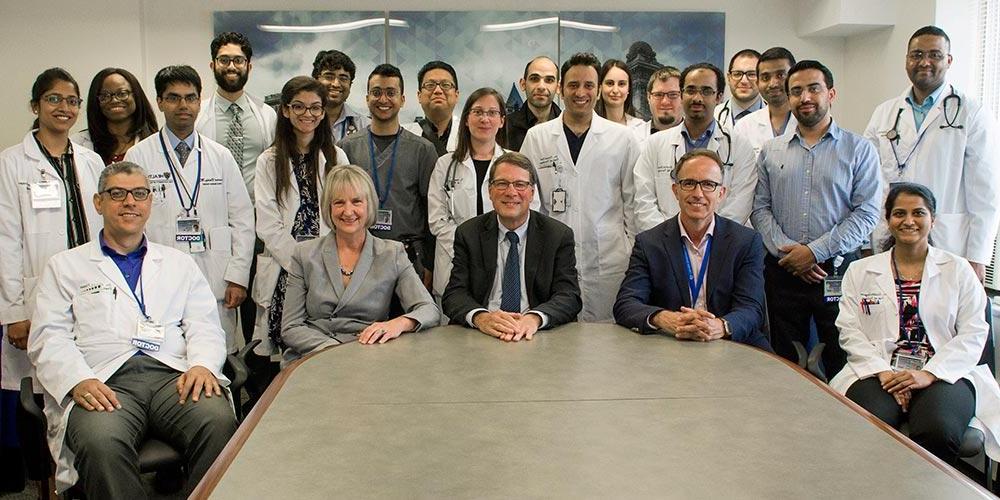The Gil S. Ross Leadership Academy at SUNY Upstate Department of Neurology
Physicians become de facto leaders the moment they earn their medical degree. During residency, interns lead complex teams of medical students, nurses and patients. Senior residents have the added responsibility of directing junior residents. Following graduation from residency, many physicians advance to administrative positions in private practice and academic settings.
Yet despite the demands of leadership placed on physicians by their roles as default team leaders, physicians receive little to no training in leadership. A recent editorial in the New England Journal of Medicine pointed out this deficit and asserted that “health systems should make leadership development an organizational priority.”[1]
In response to the leadership training vacuum, the Upstate Neurology Residency created the “Leadership Academy at Upstate Neurology.” In July 2019, Dr. Terrence Cascino, MD, FAAN, past present of the AAN visited campus to launch the Leadership Academy at Upstate Neurology. The Academy is a 3 year recurring curriculum integrated into the existing curriculum.
During the first year, the curriculum introduced the residents to basic concepts in leadership, including emotional intelligence, leadership styles and communication skills. During the second year we took a deeper dive into some of these concepts and addressed specific leadership roles physicians assume, including mentoring and difficult conversations. We also tackled conflict resolution. The third year of the curriculum features some of the challenges leaders face and offers practical methods to address them, using discussion and role play. All sessions include a large interactive component. Increasingly, our senior residents are taking a role in presenting the sessions. Each year our residents track their growth as leaders by completing a leadership skills survey.
[1] Lerman C and Jameson JL. Leadership Development in Medicine. NEJM 2018;378;20:1862-1863
Curriculum
Monthly Noon Conferences
| July | What makes a leader? Introduction to Emotional Intelligence (Dr. Bradshaw) |
| August | Leadership assessment questionnaire: small group discussions by PGY year and joint session identifying key insights. (Leadership Academy Faculty) |
| September | Preparing for Fellowship (Dr. Albright) |
| October | The ABCs of organization: getting things done. (Dr. Latorre, Dr. Bradshaw) |
| November | Teaching and mentoring Medical Students: Role plays with feedback (Senior resident teaching award winners & senior medical students, Dr. Vertino) |
| December | Emotional Intelligence: The Neuroscience. (Dr. Izadyar) |
| January | Communication Skills/Effective Listening Role Play (Dr Duleep, Dr. Bradshaw) |
| February | Leadership Styles (Dr. Masoud) |
| March | Providing Effective Feedback (Dr. Simionescu) |
| May | Burnout and Wellness (Dr. Bradshaw) |
| June | Annual Academy Evaluation (Dr. Bradshaw) |
Second Year
Monthly Noon Conferences
| July | NIH Leadership Self-Assessment & Discussion (Leadership Academy Faculty) |
| August | Racism in American Medicine: Where we've been, where we are, where we should go, and how we should get there. (Dr. Dykes, Chief Diversity Officer) |
| September | Mentoring (Dr. McGraw) |
| October | Transformative Leadership (Dr. Jennifer Bickel) |
| November | Pick the Chair's Brain (Dr. Mejico) |
| December | Emotional Intelligence Seminar: Part 2 (Dr. Izadyar) |
| February | Difficult Conversations ( Dr. Bradshaw) |
| March | Conflict Resolution (2 sessions) Tracy Fenner |
| April | Conflict Resolution (3 sessions) Tracy Fenner, Organizational & Professional Education |
| May | Top Teams (Dr. Karen Albright & the Pharmacogenomice Clinic Team) |
| June | Annual Evaluation Leadership |
Third Year
(Schedule is tentative)
| July | NIH Leadership Self-Assessment & Discussion (Leadership Academy Faculty) |
| August | Teams 2: The Five Dysfunctions of a Team (Dr. Karen Albright) |
| September | Servant Leadership (Dr. Jenny Meyer) |
| October | Conflict Resolution: Real Life Vignettes with Role Play, part 1 (Dr. Mina Michael, PGY-4, Dr. Deborah Bradshaw, Tracy Fenner.) |
| November | Conflict Resolution: Real Life Vignettes with Role Play, part 2 (Dr. Mina Michael, PGY-4, Dr. Deborah Bradshaw, Tracy Fenner.) |
| December | Diversity & Inclusion (Dr. Nicole Brescia) |
| January | Work/Life Balance (Dr. Deborah Bradshaw) |
| February | Managing Your Energy (Dr. Gene Latorre) |
| March | Leading Effective Meetings (Dr. Corey McGraw) |
| April | Positivity Science (Dr. Shahram Izadyar) |
| May | How to Tell a Story and Give a Great Lecture (Dr. Michael Vertino) |
| June | Annual Evaluation (Leadership Academy Faculty) |
The residency program offers numerous opportunities for residents to put their evolving leadership skills into play throughout training. Examples include: medical student mentoring and evaluation, senior resident roles, “Lead” Roles during the final year of training and Chief Residency.
In summary, “The Leadership Academy at Upstate Neurology” incorporates leadership development concepts from business and academic sources to implement a leadership development curriculum for neurology residents. A process of continuous resident-driven evaluation and quality improvement is used to optimize and develop the program over time.



